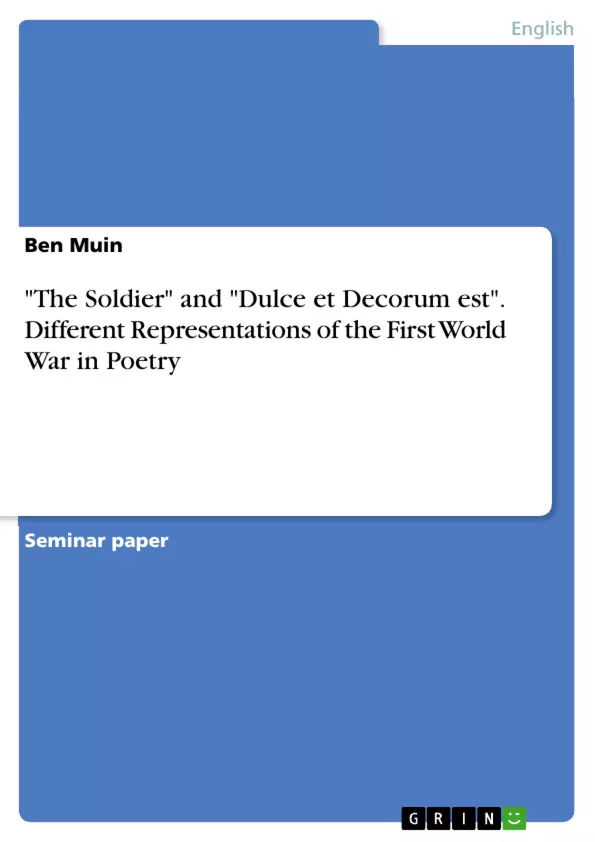Two of the most famous ‘war poets’ of the First World War are Wilfred Owen and Rupert Brooke. At first glance both poets seem to have many similarities: Both, Owen and Brooke, were civilians, who joined the army at a young age, both wrote poetry inspired by their war experiences, and both died during the war. But looking at the content of their poems the differences are significant, almost as if both poets witnessed different wars: While Brooke’s poems glorify war and the heroic deeds of the soldiers, Owen’s poetry tries to show the reality of war and trench warfare.
As both poets are examples for the changing perception of war in early and later ‘war poetry’, so are their poems "The Soldier" and "Dulce et Decorum est" examples of how those different mentalities are represented in poetry. This paper focuses especially on the form of both poems, as both use the form of the sonnet to achieve, but with very different results.
Inhaltsverzeichnis (Table of Contents)
- Introduction: The First World War and its Poetry
- Comparing „The Soldier“ and „Dulce et Decorum est“
- Theory-World War I Poetry, Rupert Brooke and Wilfred Owen
- World War I Poetry
- Rupert Brooke
- Wilfred Owen
- Analysis of the Poems
- Theory-World War I Poetry, Rupert Brooke and Wilfred Owen
- Conclusion: The Changing Perception of the War
Zielsetzung und Themenschwerpunkte (Objectives and Key Themes)
This paper examines the contrasting representations of the First World War in poetry, focusing on Rupert Brooke's "The Soldier" and Wilfred Owen's "Dulce et Decorum est." The analysis explores the changing perception of war from early patriotic sentiment to later disillusionment, with a focus on the poets' personal experiences and the evolution of their poetry.
- The changing perception of war in poetry
- The impact of personal war experiences on poetry
- The relationship between poetic form and content
- The use of poetic devices to convey different perspectives on war
- The influence of historical context on literary production
Zusammenfassung der Kapitel (Chapter Summaries)
The introductory chapter provides context by discussing the historical and cultural impact of the First World War and its influence on art, particularly poetry. The focus then shifts to comparing "The Soldier" and "Dulce et Decorum est," examining the contrasting perspectives on war reflected in these poems. The chapter explores the theoretical framework of World War I poetry, including its unique characteristics and the evolution from early pro-war to later anti-war themes.
The analysis of the poems delves into their form and content, highlighting the connection between form and meaning. It examines how Brook's "The Soldier" utilizes the sonnet form to glorify war and patriotism, contrasting with Owen's "Dulce et Decorum est" which employs a more direct and realistic style to expose the horrors of war.
Schlüsselwörter (Keywords)
The key terms and concepts explored in this work include: World War I poetry, Rupert Brooke, Wilfred Owen, "The Soldier", "Dulce et Decorum est", patriotism, disillusionment, poetic form, war experience, and the evolution of war poetry.
Frequently Asked Questions
Who are the two main war poets discussed in this paper?
The paper compares the works of Rupert Brooke and Wilfred Owen, two of the most famous British poets of the First World War.
How does Rupert Brooke represent war in "The Soldier"?
Brooke represents war with a sense of idealism and patriotism, glorifying the sacrifice of the soldier for his country.
What is the perspective of Wilfred Owen in "Dulce et Decorum est"?
Owen provides a realistic and horrific account of gas warfare, debunking the "old lie" that it is sweet and honorable to die for one's country.
Why did both poets use the sonnet form?
Both poets used the sonnet, a traditionally romantic form, but for different purposes: Brooke to reinforce classic ideals and Owen to contrast the form with the brutal reality of modern war.
How did the perception of WWI change during the war?
Poetry shows a shift from early enthusiasm and patriotism (Brooke) to later disillusionment and bitter realism (Owen) as the war dragged on.
- Citation du texte
- Ben Muin (Auteur), 2018, "The Soldier" and "Dulce et Decorum est". Different Representations of the First World War in Poetry, Munich, GRIN Verlag, https://www.grin.com/document/584715



